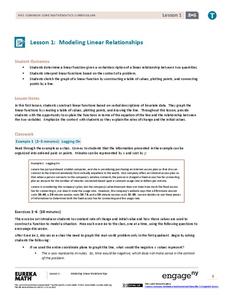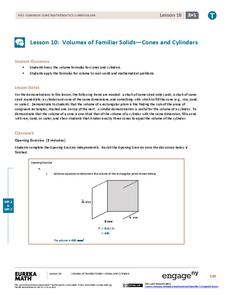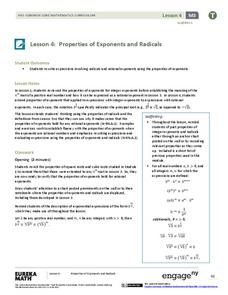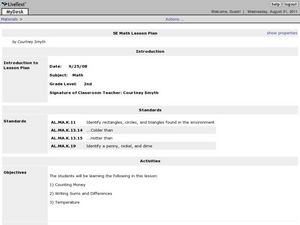EngageNY
Modeling Linear Relationships
Math modeling is made easy with the first installment of a 16-part module that teaches pupils to model real-world situations as linear relationships. They create graphs, tables of values, and equations given verbal descriptions.
Bowland
AstroZoo
Rescue animals in the zoo by applying math concepts. Groups of learners solve three missions involving oxygen, food, and climate control. Each group selects an animal from one of four bio-domes.
EngageNY
Increasing and Decreasing Functions 2
Explore linear and nonlinear models to help your class build their function skills. In a continuation of the previous lesson, learners continue to analyze and sketch functions that model real-world situations. They progress from linear...
Radford University
The Puppy’s Empire
Dogs can't do math ... but people sure can! A set of five lessons has scholars apply math concepts to solve problems related to buying a new dog, such as designing a fence and a dog house, estimating how large the dog will become, and...
EngageNY
Bean Counting
Why do I have to do bean counting if I'm not going to become an accountant? The 24th installment of a 35-part module has the class conducting experiments using beans to collect data. Learners use exponential functions to model this...
Utah Education Network (UEN)
Linear Graphs Using Proportions and Rates
Using a TI-73 or other similar graphing calculator middle school math majors investigate the linear relationship of equivalent proportions. After a brief introduction by the teacher, class members participate in a timed pair share...
Teach Engineering
Discovering Relationships Between Side Length and Area
Consider the relationship between side length and area as an input-output function. Scholars create input-output tables for the area of squares to determine an equation in the first installment of a three-part unit. Ditto for the area of...
EngageNY
Volumes of Familiar Solids – Cones and Cylinders
Investigate the volume of cones and cylinders. Scholars develop formulas for the volume of cones and cylinders in the 10th lesson of the module. They then use their formulas to calculate volume.
EngageNY
Properties of Exponents and Radicals
(vegetable)^(1/2) = root vegetable? The fourth installment of a 35-part module has scholars extend properties of exponents to rational exponents to solve problems. Individuals use these properties to rewrite radical expressions in...
EngageNY
The “WhatPower” Function
The Function That Shall Not Be Named? The eighth installment of a 35-part module uses a WhatPower function to introduce scholars to the concept of a logarithmic function without actually naming the function. Once pupils are...
EngageNY
Building Logarithmic Tables
Thank goodness we have calculators to compute logarithms. Pupils use calculators to create logarithmic tables to estimate values and use these tables to discover patterns (properties). The second half of the lesson has scholars use given...
EngageNY
Changing the Base
I can't calculate a base-2 logarithm since my calculator doesn't have a base-2 log key. Young mathematicians use the change of base formula to extend the properties of logarithms to all bases. Among these bases is the natural log base,...
EngageNY
Percent Rate of Change
If mathematicians know the secret to compound interest, why aren't more of them rich? Young mathematicians explore compound interest with exponential functions in the twenty-seventh installment of a 35-part module. They calculate future...
EngageNY
Probability Distribution of a Discrete Random Variable
Learn how to analyze probability distributions. The sixth installment of a 21-part module teaches pupils to use probability distributions to determine the long-run behavior of a discrete random variable. They create graphs of probability...
EngageNY
Fair Games
What constitutes a fair game? Scholars learn about fair games and analyze some to see if they are fair. They extend this idea to warranties and other contexts.
Bowland
Highway Link Design
Discover a renewed appreciation for the highway transportation department. with a lesson that has scholars design a highway route that meets certain conditions, including traffic flow, curves, speed limits, financial costs, and...
Howard County Schools
Generous Aunt
Witness the power of exponential growth with an activity that investigates two different savings plans. Class members create tables of values to see how and when a savings plan increasing exponentially exceeds one increasing linearly.
Concord Consortium
"Equal" Equations
Different equations, same solution. Scholars first find a system with equations y1 and y2 that have a given solution. They then find a different system with equations y3 and y4 that have the same solution. The ultimate goal is to...
Statistics Education Web
Text Messaging is Time Consuming! What Gives?
The more you text, the less you study. Have classes test this hypothesis or another question related to text messages. Using real data, learners use technology to create a scatter plot and calculate a regression line. They create a dot...
Radford University
Big Future - How SAT Scores Play a Role in College Acceptance
Understanding the importance of SAT scores is as easy as ABC. A set of three statistics lessons teaches scholars about normal distributions, the Empirical Rule, and z-scores. They apply their newfound knowledge to investigate data...
Radford University
Parallel Lines Cut by a Transversal
Use the parallel lines to find your way. After first reviewing geometric constructions and the relationships between angles formed by parallel lines and a transversal, young mathematicians write proofs for theorems relating to parallel...
Radford University
How Much is in There? A Polygon Investigation
Try to find the triangles in various polygons. An investigation has learners develop a formula for the sum of the measures of the interior angles of a polygon. They use manipulatives to partition each polygon into triangles, then...
Curated OER
Counting Money Activity
Second graders explore commerce by practicing monetary transactions. In this consumer math instructional activity, 2nd graders practice using math functions to add and subtract different amounts of money. Students identify the different...
EngageNY
Sequencing Reflections and Translations
Don't get out of order! Examine the effect of order on a sequence of transformations. Learners perform reflections and translation transformations in sequence. They see that changing the order of the transformations does not always have...























